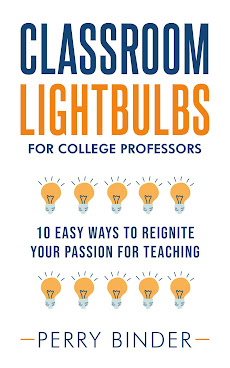Excerpt, Innovative College Teaching
What Happened to Steve?
My classroom syllabus says: No legal advice questions! But I
still get calls from students, sometimes when it’s too late – after they
have a court date.
You know how you get one phone call before you get hauled off to
prison? Well, I was in the office and got this call from “Steve:”
“Help me Perry they’re taking me awaaaaaaaaaaaaay!”
I’m like:
“Where the heck are youuuuuuuuuuuuuuuuu?”
“The DeKalb Detention Center.”
Yeah. So I had a night class. After my night class at 10 o’clock
at night, I’m on the highway getting off at Memorial Drive and there’s a
McDonald’s, a Dunkin’, and a huge building with people banging on the
window screaming:
“Get me outta here!”
And I walk in there with my squeaky voice:
“Uh, I’m here to see my student.”
And they’re like:
“You’re just a lowly prof; get outta here.”
So I fumble around in my wallet looking for an attorney Bar
card, and I find a CVS card, a Costco card, a ticket to the Vatican, and
finally I find the right one.
They put me in this bright white room with a huge window
overlooking the jail. And by the way, it’s a very clean facility if
you’re looking to visit or even stay for a bit. So anyway they bring out
my student, on the other side of the glass, in his orange jumpsuit and
handcuffed and he is sitting there and he is really, really looking
distraught.
Now remember I told you my experience is as a commercial
litigator. I never did criminal law so my knowledge of that is from TV.
So I drew off that experience, and I put my hand up on the glass with my
fingers spread apart.
And Steve’s looking at it. And looking at it. And I don’t move an inch.
And then he put his hand on mine and smiled!
The TV hand thing works!
Why do I tell students this story on the first day of class?
Here’s what my student did. He was driving excessively, over 100
miles an hour. He got a ticket for reckless driving, which is a
misdemeanor. Here was his real crime: Being young, goofy, and showing up
to court without an attorney. The judge threw him in jail for ten days.
If he had an attorney, what likely would’ve happened was some kind of
plea deal with no prison time.
So now here he is sitting in jail and I had to get him a
criminal attorney that he’d have to pay a whole lot more than if he had
one in the first place. That attorney somehow got him out in three days.
In this class, we discuss when you need an attorney and when you
do not need an attorney. Before a problem gets really big, that’s when
you need an attorney. And we will talk about a lot of those scenarios.
We’ll talk about you as a businessperson, but we’ll also talk about your
rights as an individual, and how to apply the law to each situation.
And be careful, since the judge has a lot of power. Always remember: It’s good to be the judge.
What Happened to Betty?
Another time, my student, “Betty,” was arrested after attending a
Tone Lōc concert. She unknowingly wound up as a passenger in an
allegedly stolen vehicle. The next morning, I received a phone call from
Betty’s grandmother asking me to bail out her granddaughter.
After getting the cash from grandma, I went to the county jail
where the guard took me to a dim and dank holding cell. I was looking
all lawyerly with my blue pinstripe suit and sharp leather shoes and
briefcase. Another guard escorted Betty into the cell. Her hair was
disheveled, a stiletto was missing from one shoe, and she looked
frazzled. I said:
“Betty, we have two options, I could get you out of here now,
or” – as I reached into my briefcase – “right now, you can take the
Midterm Exam that you missed last week.”
Betty’s reaction?
“Get me the frick out of here!”
Ninety minutes after the exam commenced, Betty was set free. I’ll let you judge for yourself how true the prior sentence is.
Always remember: It’s good to be the prof.
Takeaway
In the above anecdotes, I am not suggesting that college
professors show up to jail at 10:00 p.m. or at a grandma’s home in the
wee hours of the morning. Rather, my point is to let students know that
they can contact you in an emergency to guide them to appropriate help
and resources.
Listen to this Story
The Steve story can be viewed on my YouTube channel @Perry_Binder. (3-minute clip)
Excerpt, Innovative College Teaching (Chapter 1 Appendix)




















.jpg)